Noby, synergy of Antwerp creatives
The expertise of design bureau Studio Dos Santos
The strength of the Antwerp creative scene lies in the huge amount of available expertise. From product designers and strategy specialists to audiovisual wizards and illustrators: Antwerp is thriving with its numerous creative masterminds. The developers from Nobi’s smart light will surely agree with this. They joined forces with Studio Dos Santos to develop an innovative smart lamp which sets new benchmarks regarding smart home solutions.

Falling is a major problem among the elderly: one third of over-65s fall at least once a year, of which 66% are seriously injured. The solution that Nobi offers for this situation is innovative, to say the least. Both revolutionary and Belgian: Nobi is an automated, bright light that registers movement, temperature and air quality via sensors and artificial intelligence. The lamp’s showpieces, however, are the fall detection and communication capabilities. These systems provide the necessary extra assistance in residential care centres and in the homes of the elderly single people. Nobi anonymously maps the movements of those present and even informs them through voice messages. All these innovations are hidden in Nobi’s stylish design: right up the alley of Antwerp-based design firm Studio Dos Santos.
Initial phase
The cooperation between Studio Dos Santos and Nobi developed very organically. Bert De Haes, co-founder of Nobi, used to work with the design studio in the past, for example for similar applications and smart home products such as switches and lighting. According to David Dos Santos, Nobi involved his namesake studio right from the very beginning and immediately gave them a full slate of tasks. “The whole idea was quite challenging because there was actually a stigma attached to it: we had to equip a normal object with monitoring technology for the elderly.
An ordinary, everyday design was a must: Nobi’s look must not stigmatise. The fall detection was another essential element. Elderly people who lie on the floor for more than one hour, die statistically much quicker in the following six months. Together with Nobi, we therefore started off by having some intense brainstorm sessions. After the first two brainstorms, we had plenty of ideas: we really had to give priority to the most urgent and essential functionalities.”
Design
After the initial brainstorm sessions, the teams defined the basic functionalities: bright lights, connectivity and smart motion sensors with fall detection. From there, David and his studio worked on a thorough market research. "We met with care staff and looked at different scenarios. This led to numerous questions. Which functions are useful in a service flat? Where can we hang the lamp? Which features do our competitors have to offer?
In the meantime, our studio also started working on the design, which had to be as sleek as possible. This was the only way to make Nobi fit seamlessly into any space, both living rooms as larger rooms in residential care centres. Nobi had to be a welcoming, friendly and soft product. Subsequently, our team immediately set to work on the design language and accelerated the project by creating prototypes.”
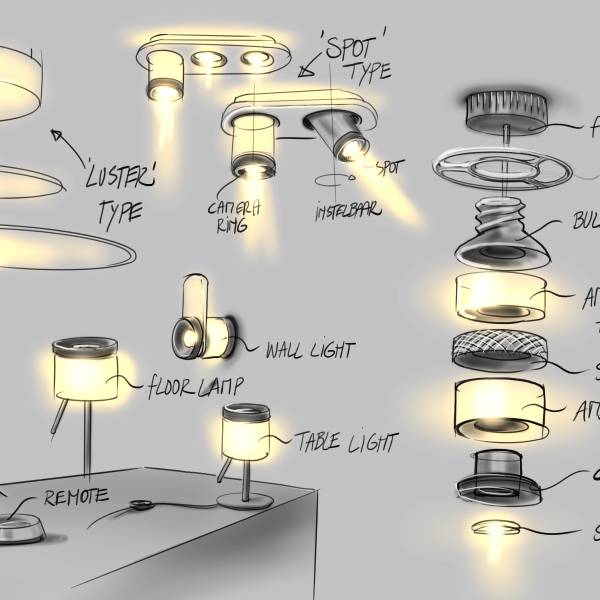
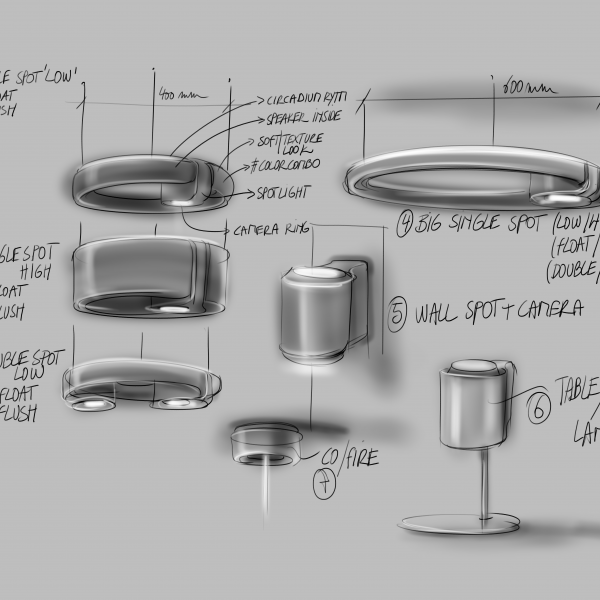
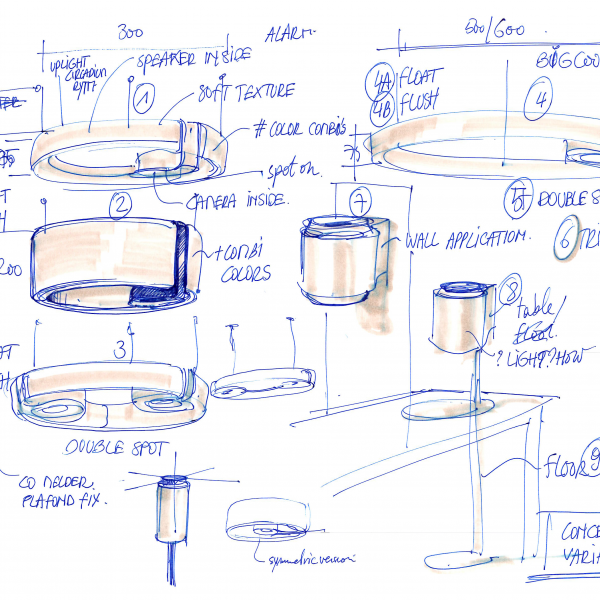
Prototypes
When it comes to prototyping, Studio Dos Santos really excels: this also became clear in the development of Nobi. "Our studio has a reliable and wide network of suppliers who can create absolutely anything: from 3D and vacuum prints to milling and metal finishing. What's more, they work extremely fast, so we can switch very quickly when changes are required," says David. Stijn Verrept, Nobi's CEO, is more than happy to confirm this: "That first prototype? I'll be honest: it was so good that it could immediately serve as a demo model. It really looked the way we wanted it. The real functionality and hardware still had to be developed, but by getting the housing right from the start the whole project really picked up speed.”
Synergy
Meanwhile also Nobi’s team was running at full speed: the software architecture was in the reliable hands of their experts. In addition, Nobi’s hardware specialists joined forces with Studio Dos Santos to focus on the circuit boards and sensors that had to fit into the housing. This organic interaction is one of the examples of the synergy that drives the Nobi-project. Both teams never lost their overview in this complex project, however.
Through regular meetings, the teams were able to thoroughly highlight the must-haves and nice-to-haves of Nobi and keep their focus on the product. While the team at Nobi had time to finetune the functionalities of the smart lamp, Studio Dos Santos worked on the cost-efficiency of both the production and the materials. Throughout the project, the design studio was able to reduce the number of materials used for the housing from twenty to four parts.
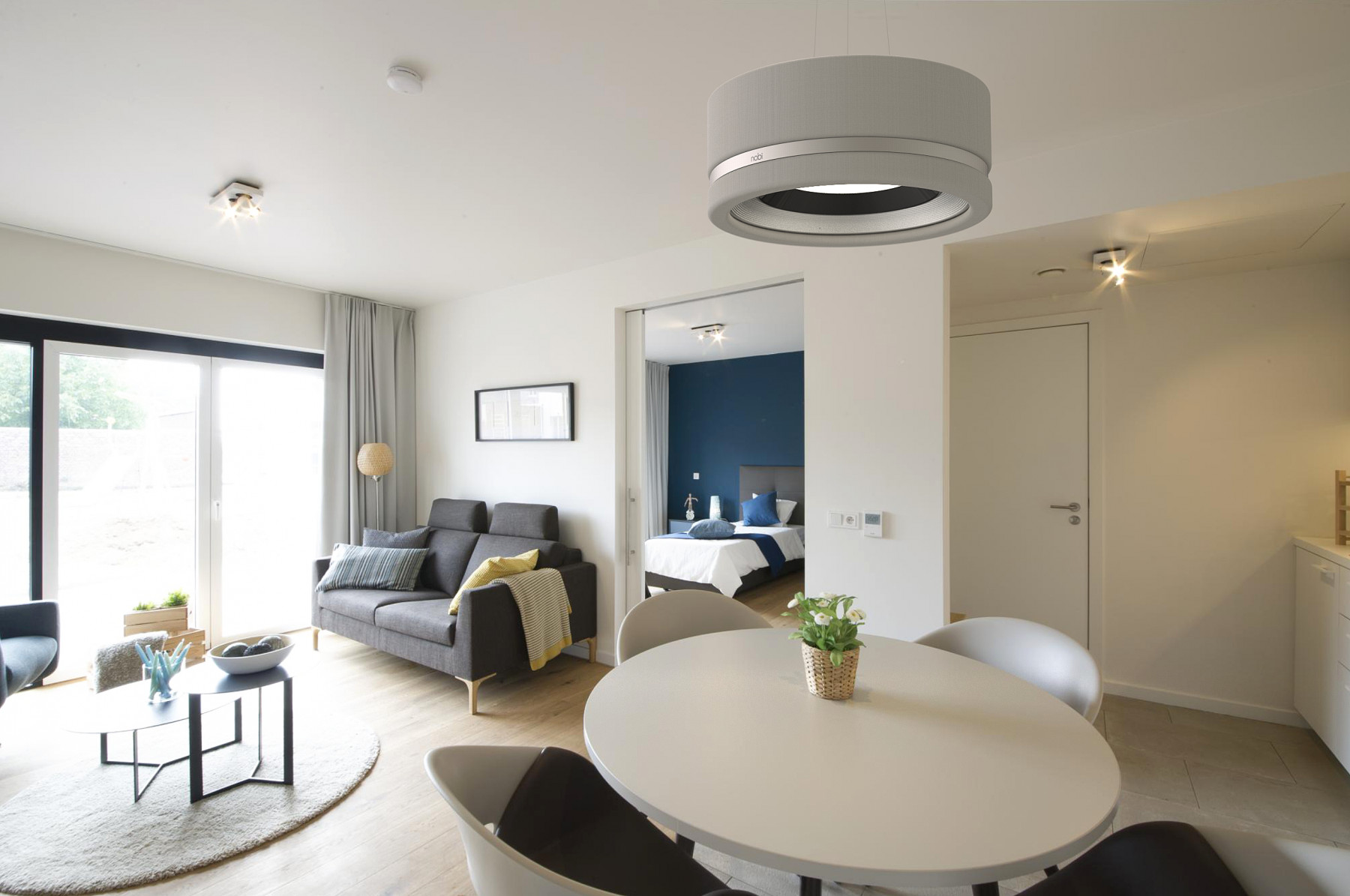
Communication
A sophisticated project like Nobi also has its challenges, of course. "Especially Nobi’s communication capabilities became a necessary aspect for us during development," says Stijn. "After we had the first prototypes tested, some users wondered whether the lamp really worked. After all, when Nobi is not detecting a fall, it is silently present in the background. Then we realised that Nobi should also be an artificial buddy: a monitoring system that offers companionship. We made it as human as possible: the lamp now says 'good morning' when it detects that someone has got up. Moreover, Nobi informs about the time of day and the weather forecast through its built-in speaker. This is a really indispensable factor for the elderly: they know that the lamp is watching over them. In addition, Nobi also provides them with reminders through the built-in calendar function. The lamp lets those present know if a birthday is planned, if they have a hairdresser's or doctor's appointment and when they need to take their medicine: more than helpful for dementia sufferers, among others.”
Privacy
Nobi's monitoring system is fully compliant with privacy legislation. "A lot of thought has gone into that, too," Stijn reassures us. "Nobi does not film people, but models them as stick figures (minimalist line models, ed.) and only shows these models when there is an alarm situation. In that case, Nobi displays the simplified stick figure on the actual image: the individual is unrecognisable, but you can immediately see what is going on.
Furthermore, no one should feel that they are being monitored: that is why Nobi is a lamp, something that is present in every room anyway. Yet it contains the best artificial intelligence of this moment. Nobi knows whether the person is drinking enough, sleeping too long or even having too few visitors: all completely anonymously. Moreover, the interpretation of the sensors is done entirely in the lamp itself, via the powerful processor and our AI model. This way we avoid sending images to the cloud and guarantee maximum privacy.
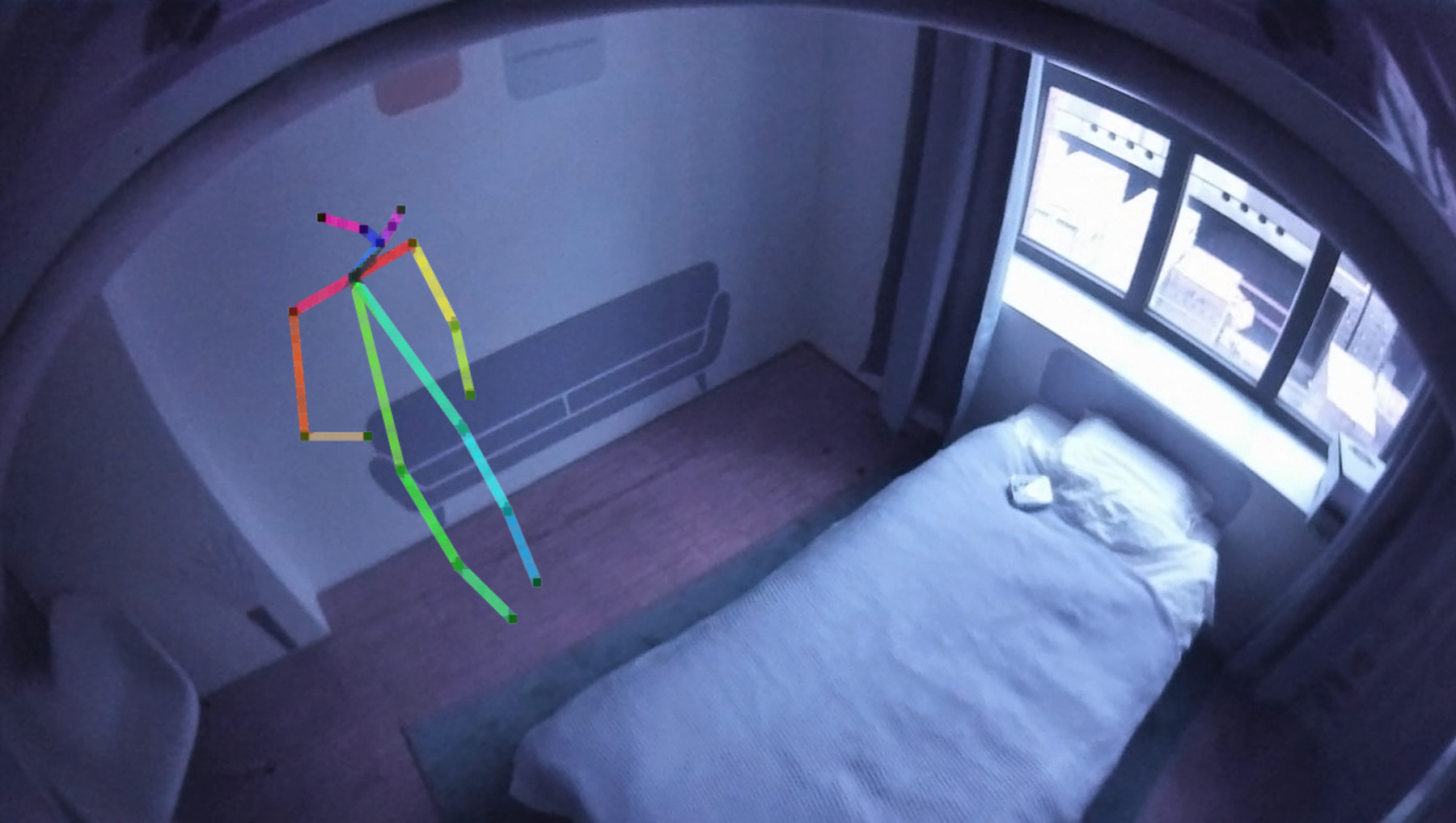
Global
Unique in its kind: it is more of an understatement. Nobi is a product that literally amazes the whole world. CES, the world's largest innovation fair, gave Nobi extra attention. In addition, numerous specialised magazines mentioned Nobi in their rankings and the product even received a USA Today Editor’s Choice. All these praises predict a bright future for one of the most promising pieces of technology in the coming years. No wonder Nobi has already won a Henri van de Velde award in Belgium, in the Business Innovation and Consumer categories. Putting the added value of a designer in the spotlight is what it's all about.
Future
For Stijn it is clear: "The operation of the product goes hand in hand with its design. Without Studio Dos Santos, Nobi would have been completely different. Thanks to their clear visualisations, cost-efficient approach and large network of suppliers, the project really picked up speed. We are therefore continuing to work together on a more compact Nobi, called Nobita, which can also be used in damp spaces such as the toilet and the hall.
Nobita serves as the companion piece to the Nobi, including fall detection and bright LED lighting. We are also developing the accompanying alarm button and the compatibility with bluetooth peripherals. And of course, we’re awaiting feedback from Nobi’s real users. From May 2021 onwards there will be a roll-out in the B2B sector, mainly for service flats. Towards the end of 2021 we plan to launch in the consumer market. And then the story really begins!”
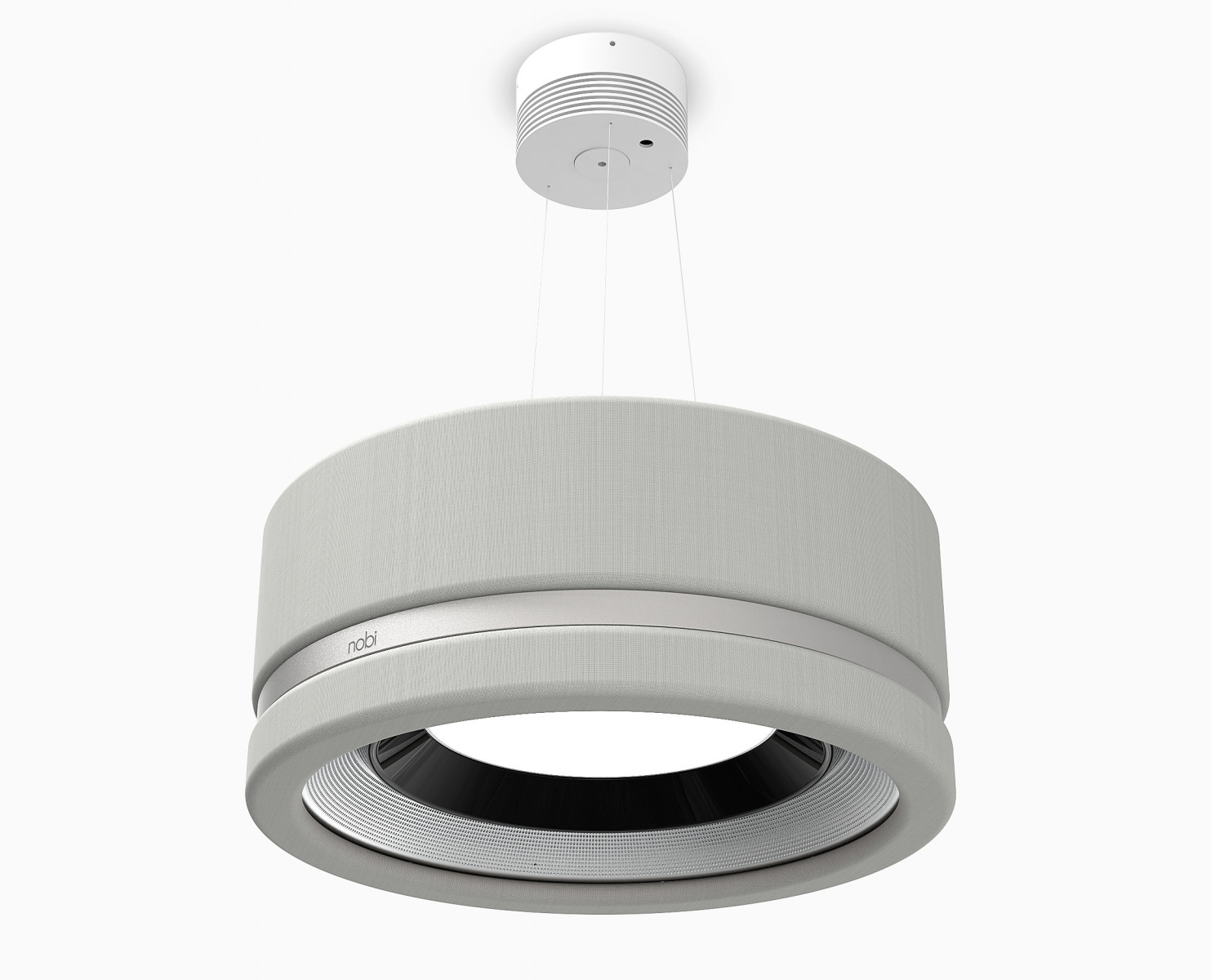
Antwerp start-up
Nobi has a promising future, but after all, it is still a start-up. "There really is that start-up atmosphere in Flanders," says Stijn proudly. "Thanks to numerous subsidies and support from VLAIO and the government, we can focus entirely on our goals. A Fleming often presents himself as an underdog, but that is really not necessary: we have all the talent in AI, design, software and development." David shares that opinion: "The last few years that startup atmosphere has become turbo-charged, especially in Antwerp. There is such a tight network of creatives, designers and freelancers here, and they are all progressive. You really feel that people are committing themselves, compared to a few years ago. To help build these stories as a design agency is really satisfying.”
From product development to animation, the Nobi smart lamp appeals to the wide mix of Antwerp creatives. Currently, the lamp is still in development and is being tested in residential care centres, where it will be applied on a larger scale from May onwards. Nevertheless, this revolutionary piece of technology already brought Nobi a Henri van de Velde award in the categories Business Innovation and Consumer. On the 5th of February 2021, it won the Consumer Gold Award as well. Curious about Nobi’s smart lamp? Read more.
